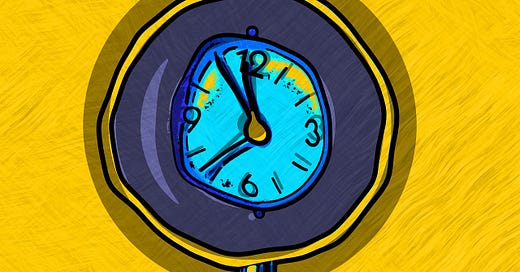Tip-Off #151 - Doomsday
"Faith is the bird that, sensing the light, sings not of dawn, but of trust in the night." ― Rabindranath Tagore, poet/polymath from Bengal.
The Doomsday Clock has been inching closer to midnight for years. Recently, the Atomic Energy Commission reset it to 11:58:30, leaving us with 90 seconds. This alarming announcement, made at a press conference, felt routine. The phrase "Repent for the End is Near" has become a tired joke. The Apocalypse competes for attention with Trump …
Keep reading with a 7-day free trial
Subscribe to 2 + 2 = 5 to keep reading this post and get 7 days of free access to the full post archives.




